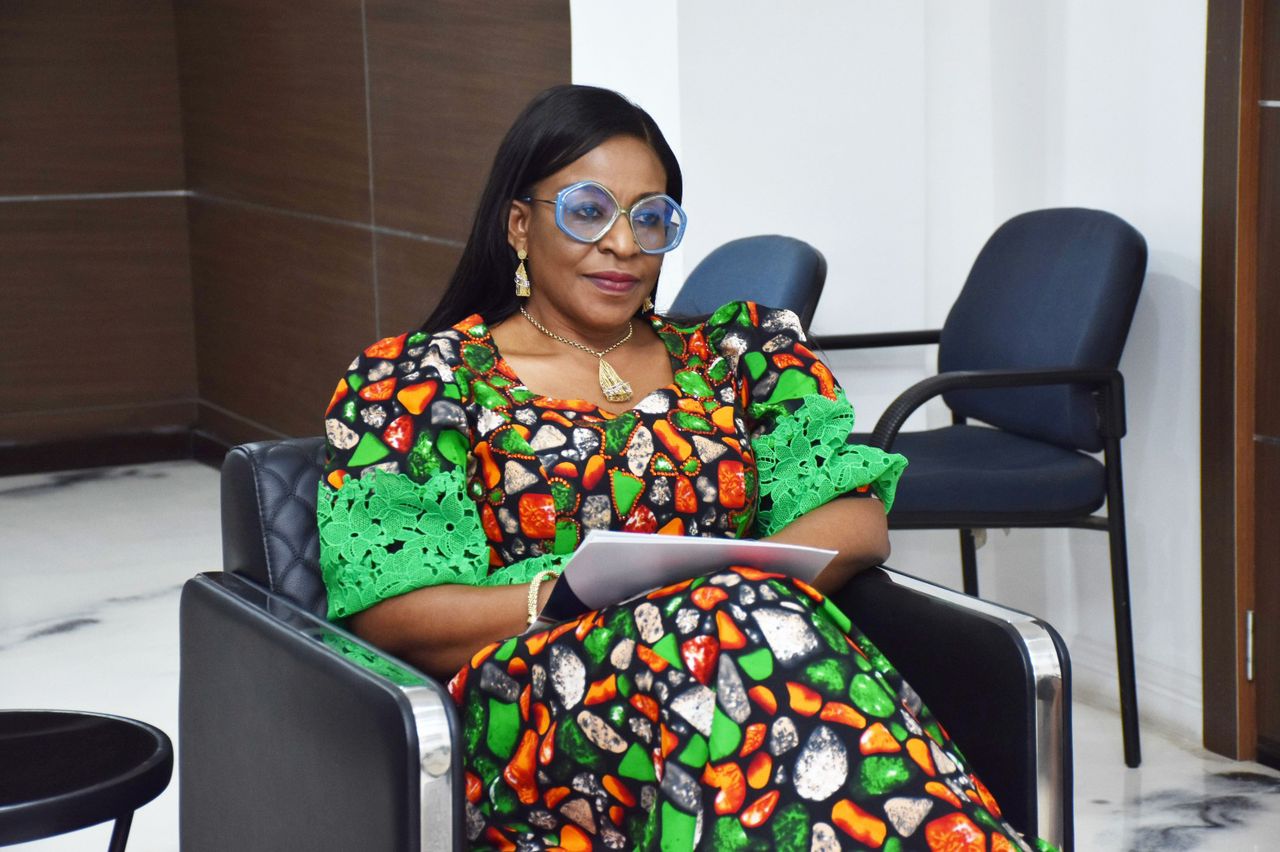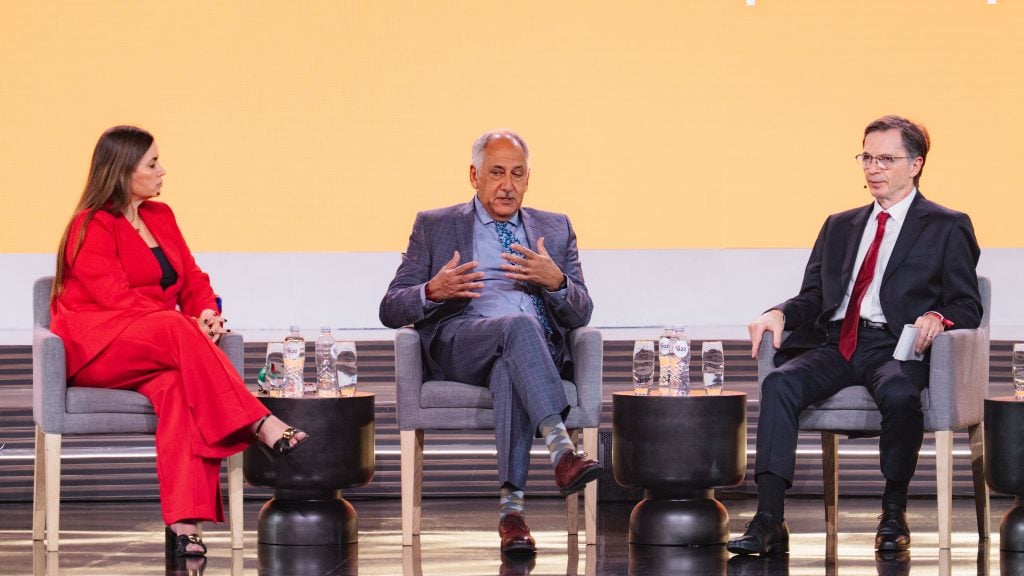
Nonye Ayeni is receiving guests, taking meetings and encouraging visitors to sign the guest book inside the buzzing Nigerian pavilion at the Intra-African Trade Fair (IATF) 2025 in Algiers. Attending her second IATF from 4 to 10 September, the executive director and CEO of the Nigeria Export Promotion Council (NEPC) is delighted with Nigeria’s pavilion and footfalls.
“You can see for yourself. This is bigger and better than Cairo,” she says, waving to take in the expansive space. “You can see people, buyers, vendors, trooping in and out of the Nigerian pavilion. We’ve never experienced something like this. This is the most-visited pavilion.”
The Nigerian delegation is 70-strong and sponsored by the NEPC, working in conjunction with the Small and Medium Enterprises Development Agency of Nigeria, the Bank of Industry, the Nigerian Export Import Bank and the Nigerian Import Promotion Council.
“The 70 exporters are all excited and preparing to sign MoUs [memorandums of understanding]. They’ve made contacts, they’ve networked. You can see they have great things from fashion to spices to food to even cosmetics. This is a great event.”
Ayeni says that “in the past, agencies used to work in silos, but we are now working together and achieving more. Look at our pavilion; you can see it’s not just one pavilion. We all came together and brought our collective experiences and skills to make this a powerful thing.”
Appointed the chief executive officer of the NEPC in 2023, Ayeni came to the role from her position as managing director of Signature Bank, where she was one of a handful of female bank chief executives in Nigeria.
That experience in the rough-and-tumble world of Nigerian finance has set her up for the huge task of enabling Nigerian business to make the most of long-neglected global export opportunities.
Value addition is key
Progress, she claims, is palpable. Addressing the press on the performance of Nigeria’s non-oil sector, Ayeni announced in August that Nigeria exported non-oil products worth $3.225bn between January and June 2025, up from $2.696bn recorded in the first half of 2024. Growth was also reflected in the export volume, which rose to 4.04m metric tonnes, compared to 3.83m metric tonnes in the same period of the previous year.
Nonye Ayeni credits the strong showing to leadership and collaboration. “I’ll start by saying that the Renewed Hope Agenda of his Excellency President Bola Ahmed Tinubu is not just an initiative. It’s a force.” She also cites a direct result of increased global demand, improved product quality and expanded market access facilitated by the African Continental Free Trade Area (AfCFTA).Yet she believes the value and volume of Nigeria’s exports can grow further still.
“Value addition is the way to go, because if you add value to your products or commodity, you earn premium prices in the global market. We are working with our exporters from the farm gate through to market access and ensuring we export processed or semi processed products.
Instead of exporting shea nuts, the NEPC is working with women to convert them into shea butter. Instead of exporting raw leather, the NEPC is teaching women to make bags. Working with Lelook Bags Academy, NEPC set up the Export Skill Acquisition Center in the Apapa area of Lagos. “At the NEPC we believe that value addition is the way to go. We are building their capacity, opening their minds and their horizons to see what they stand to gain when they add value.”
Thriving in a tough trading environment
While market linkages between Nigeria and the rest of the world are increasing, trade rules are becoming ever more complex globally. The EU’s Carbon Border Adjustment Mechanism is imposing strict environmental standards on imports from outside the bloc.
Meanwhile, tariff-free access to the US, once enjoyed under the African Growth and Opportunity Act, is coming to a shuddering halt under the Trump presidency, which has imposed a 15% tariff on Nigerian imports.
Two years into the job, Ayeni has prioritised capacity-building and skills development as a means of helping Nigerian exporters to compete in a difficult trading environment.
In her half-year report for 2025, she announced that the Council organised 252 training programmes, reaching 27,352 participants across Nigeria in six months. These sessions covered export documentation, quality standards, packaging and good agricultural practices.
“A lot of things are being done in the area of capacity-building. We have a packaging expert in the council. If you add value and you don’t have the right packaging, you may not fit into global international standards.”
Also, “certification is very key because it’s not just there to add value. If your product does not meet the quality and standard [benchmarks], it’s not going to go anywhere.”
Boosting intra-Africa trade and women
The deteriorating global trade environment also highlights the growing importance of intra-African trade. The top three destinations by export value for Nigerian products in the first half of 2025 were the Netherlands (18.64%), the United States (8.42%) and India (8.36%). Intra-African trade, she notes with disappointment, is still below 15%.
Ayeni says that the AfCFTA is “a powerful platform” that “promises to be the largest single market in the world, connecting 55 countries and about 1.4bn people. So, it is a powerful platform that we should take advantage of.”
Ayeni says that supporting women-led and owned businesses will also be key to improving Nigeria’s export opportunities. “At the risk of sounding like a broken record, I always say that the best man for the job is a woman. That’s number one.
“Secondly, women are resilient, dogged and very passionate in what they do.”
The NEPC has been chosen as a pilot beneficiary of the Women Exporters in the Digital Economy (WEIDE) fund, launched by WTO director-general and former Nigerian finance minister Ngozi Okonjo-Iweala. The fund will help to support female-led businesses to take advantage of digital developments in the export economy; 146 beneficiaries have been selected from over 67,000 applicants. “They will get grants, some will get as much as $30,000. Some will get $5,000. But what excites me is that it’s not just about the grants. They’re going to train them and enlist them to digital trade, and you know that digital trade is the way to go because it’s very transformational.”
Looking to the future
Despite global headwinds, Ayeni is encouraged by the over 20% year-on-year growth in the non-oil export sector since she assumed leadership of the NEPC. “The outlook is positive. We did 20.7% last year. If we continue on that trajectory, this year is going to be better than last year. The volume and value will increase; but, again, it’s not just about volume and value. The numbers of products and countries should increase too, as we try to enlist more countries through creating market access and linkages. We are hopeful that this year is going to be very successful.”
Two days before we met, Nigeria was announced as host of the 2027 iteration of the IATF, the continent’s biggest trade and investment showcase – another opportunity to put the country’s exporters in the shop window. “It means a great deal for us because it’s the first time we are hosting IATF in West Africa. The past editions were held in Egypt and South Africa. We look forward to it as an opportunity for Nigeria and Nigerians to showcase what they have. It’s an opportunity for us to create visibility for our products and I believe it’s going to open up the country economically.”






Recent Comments